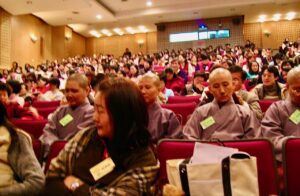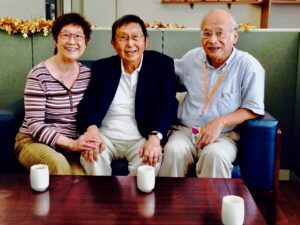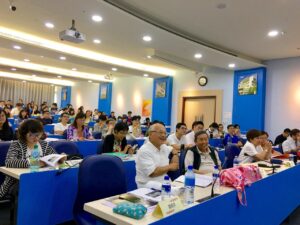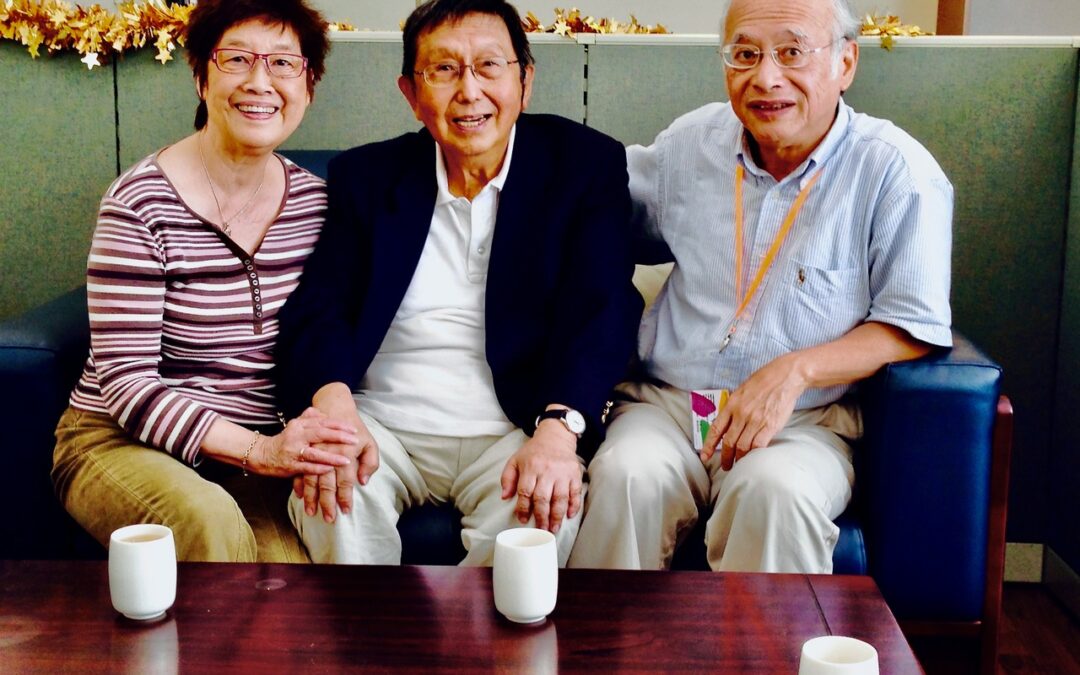We are all saddened by the recent death of K. K. Hwang (National Taiwan University, 2015). The Chinese Indigenous Social Science Association has lost its founder and guiding light. I have lost a friend and a partner in our shared mission of advancing international psychology based in East-West Integration.
My Friendship and Shared Mission
I first met K. K. in the January of 2006 during my first lecture tour in Taiwan, organized by Harriet Wu from Fo Guang University and Suemay Chang from the National Kaohsiung Normal University. The two highlights that stood out in my crowded schedule were:
- Speaking to a packed lecture theatre in the National Taiwan University of Science and Technology (Taiwan Tech, n.d.), full of clinical psychologists and Buddhist monks, as shown in the following photo:

- My visit with K. K. Hwang in his spacious office at the National Taiwan University, the top-ranking university in Taiwan (Times Higher Education, 2023).
Even though we had never met before, he greeted me with warmth, sincerity, and openness, some of the characteristic of Confucian relational ethics which permeated his life and research. My immediate emotional reaction at that meeting felt like the pleasant surprise of meeting an old friend unexpectedly.
By the end of an hour-long conversation, I felt a deep sense of joy and gratitude from finally finding a kindred spirit after many, many years of struggling alone in North America, facing prejudice and discrimination (Wong, 2020).
It was very refreshing and uplifting to me to see him share with me his passion, feelings, and thoughts in a very open and deep way, even raising his voice when he felt strongly about something he did not like. He was talking just like me: direct, passionate, honest, and making ourselves vulnerable, not the kind of polite, detached, and superficial talk so prevalent in the West.
I do have many friends and collaborators in North America, but do not have any deep friendships. For some reason, they are usually too busy with their inner circle, which I could never get in. However, in K. K., I had finally found a royal friend and partner in our shared mission. I am grateful to Harriet and Suemay, who connected K. K. with me.
At the end of our animated discussion, we both come to the same conclusion, via different routes, that the only realistic way to develop an international psychology was to discover the universal principles based on human nature. His approach was based on ancient Chinese wisdoms from Taoism, Confucianism, and Buddhism, emphasizing one mind but many mentalities in different cultural contexts (Hwang, 2009a, 2011; Kim et al., 2006).
For me, it was more complicated. I grew up soaked in traditional wisdom like K. K., but I was later converted to Jesus Christ as taught in the Bible. There, my first struggle was to reconcile my Christian faith with tradition Chinese beliefs. My second struggle was discovering unifying principles to integrate East and West through existentialism (Wong, 2006). But at the end, I came to a conclusion very similar to K. K.’s.
More specifically, I propose that the most promising way to develop an international psychology is to discover the existential universals that are based on unchanging human nature and the human condition, but also reveal the unique experiences and expressions of these universals in different cultural contexts or different indigenous psychologies (Wong, 2023, in press).
Most of our discussions centered on how to avoid both Euro-centric and Asian-centric biases by finding the essence of universal human phenomena in spite of semantic and theoretical differences between East and West.
Here is another photo of my wife (Lilian Wong) and I visiting K. K. in 2013.

In this visit, we continued to explore ways to integrate East and West based on Chinese traditional wisdom without violating the principle of unity. We could hardly wait to greet each other and delve deeply into our shared mission of East-West integration. Altogether, I made five lecture tours to Taiwan. There are many reasons why I consider Taiwan as my academic home (Wong, 2017a). Primarily, they accept me as one of them and they welcome my existential positive psychology (PP2.0). Many of them, such as Harriet, Suemay, and K. K. are my lifetime friends.
During my last month-long visit to Taiwan in 2017, one of the highlights was a symposium on Chinese Indigenous Psychology and PP2.0, featuring K. K. and me as keynote speakers at the National Kaohsiung Normal University (Wong, 2017b). You can see us both at the symposium in the following photo. One can readily see that we were really happy to see each other again and share the same platform.

In front of a large audience, K. K. fully demonstrated the spirit of Confucian relationalism (Hwang, 2017). He was very respectful and modest in expressing our differences. For example, we had two different Mandela models of the self and happiness. We also had different ideas about how to integrate the basics of Confucianism in developing a general theory of global wellbeing.
But on the main points, we fully agreed that we can no longer passively accept Western hegemony and colonialism and we need to redouble our efforts to advance the indigenous psychology movements in non-Western societies. We need to develop an international psychology that reflects Asian indigenous psychology in its theory, epistemology, methodology and the use of different terminology to express the same idea.
One of the fruits of this collaboration is him accepting my paper (Wong & Cowden, 2022) in a special issue in Frontiers in Psychology that he edited. In that paper, I draw on several examples (i.e., non-duality and dialectical interaction, Wu-Wei, Zhong Yong) to illustrate how principles of Asian psychology could contribute to reshaping mainstream psychology.
I particularly object the Western binary view of seeing good and evil or internal and external control as bipolar on the same continuum. Instead, I propose an alternative Asian conception of non-duality of seeing these opposite poles as two parallel but complementary and interactive dimensions. According to this dialectical non-duality view, a person can be both internal and external, both happy and sad (Wong, 2016; Wong, et al., 1978). I am pleased that the objection to bipolarity is finally more widely recognized (Zhao & Tay, 2023).
Finally, I am most grateful to what K. K. did for me. In spite of his busyness in various research projects and administrative responsibilities, he volunteered to write a strong and lengthy letter of recommendation for the Fay Tang Prize in Psychology (Tang Foundation, n.d.) for two reasons: First, Fay Tang was one of his former students at the National Taiwan University. Second, he believes that since this prize is international, the foundation would consider an influential Asian approach to wellbeing. Unfortunately, the Tang Prize in psychology once again went to the Western individualistic tradition on psychological wellbeing. But I really appreciated K. K.’s faith in me and his efforts. His letter is now on my website for the broader audience to judge whether our Asian approach towards global wellbeing is worthy of research support (see this link to view his letter).
K. K.’s Contributions to International Psychology.
His contributions to both Chinese indigenous psychology and international psychology are enormous. Given the limited space, I will focus only on Confucious relational ethics (e.g., Hwang, 2009b; Hwang & Bond, 1986).
In my personal experiences and my own research on cross-cultures differences (e.g., Wong, 2013; Wong & Reker, 1985; Wong & Ujimoto, 1998; Wong et al., 2006), I have always known implicitly that the main difference between East and West lies in the depth of relationships, whether it is filial piety, friendship, or commitment to marital relationships.
Here are some examples: I have supervised several graduate students, post-docs and psychotherapists in need of licencing, but only Theodore Cheung (n.d.) showed his gratitude and respect by giving me mooncakes every mid-Autumn festival and offering me help whenever I need him. Of all the undergraduates I have taught, only some Chinese students still show concern and support to me. Of all my friends over the years, only the Chinese stayed close to me as true brothers and sisters until death.
In contrast, the other friends I have made in North America who do not have deep roots in Asian culture tend to be superficial and our relationships are based on social exchange. I have the uneasy suspicion that I am being treated as an instrument to be used, rather than a human being to be loved as part of the human family.
In view of the above, K. K. is spot on in emphasizing the Confucian relational ethics as the foundation for relationships at all levels, from harmony within oneself, with others, with ecology, and with the spiritual world.
In the West, there is already a large literature on the importance of relations or connection. For example, Adler (1933/1964) considered social interest or belonging as the key to meaning and happiness. Wong pointed out that both Frankl and Adler recognize that relationship is the key to living a meaningful life (Hsu, 2017).
There is also a strong empirical base for this conclusion (Reizer et al., 2013; Schnell, 2009; Wong, 1998). In addition to Rosmarin’s (2021) book on connections, a recent review paper (VanderWeele, 2023) also focuses on the importance of having an impact on the group or society as essential for meaningful living.
In addition, we can all recall the various commune movements in North America. Personally, I used to live in one of those hippie-communes in Texas during the early 70s. But eventually, most communes end in disrepute (for a critical review, please read Canadian Association for Security and Intelligence Studies, 2019).
One wonders why the Chinese community, in every corner of the world, can survive all the tumultuous changes. Both K. K and I believe that Confucian relational values play an important role in maintaining the Chinese civilization for over 5000 years and contributing to the survival and flourishing of oversea Chinese over the years.
Therefore, it is worthwhile for the Western psychology community to learn the ancient Chinese secrets to interpersonal harmony, happiness, and resilience (Hwang, 1987, 2001). While the West focuses on outcome and benefits to the self, Confucian societies focus on humanism and relationships.
It is beyond the scope of this paper to delve into the details of K. K.’s teachings on Confucian relational ethics. Briefly, the principles include the social norms of getting along, maintaining appropriate closeness, remembering the importance of “renqing (favor),” showing proper respect and saving “Face,” cultivating empathy, compassion and trust, and treating people with sincerity, which is considered the way of Heaven. The key is to maintain interpersonal harmony based on a yin-yang perspective (Huang, 2016).
In conclusion, I feel that, in some way, K. K. is irreplaceable in terms of the depth of his understanding and the impact of his research. By his personal example, he urges all of us to work together in advancing the indigenous psychology movement. We are grateful for the precious gifts of K. K.’s legacy.
References
- Adler, A. (1964). Social interest: A challenge to mankind (J. Linton & R. Vaughn, Trans.). Capricorn Book. (Original work published 1933)
- Canadian Association for Security and Intelligence Studies. (2019, March 30). A brief history of social movements in North America. The Journal of Intelligence Conflict and Warfare, 2(1), 11. DOI: 10.21810/jicw.v2i1.958
- Hsu, C. (2017, November). Highlights on the Taiwan Lecture Tour: Report by a Board Member (by Chieh Hsu). Positive Living Newsletter. http://www.drpaulwong.com/highlights-on-the-taiwan-lecture-tour/
- Huang, L.-L. (2016). Interpersonal harmony and conflict for Chinese people: A yin–yang perspective. Frontiers in Psychology, 7, Article 847. https://doi.org/10.3389/fpsyg.2016.00847
- Hwang, K. K. (1987). Face and favor: The Chinese power game. Am. J. Soc., 92, 944–974. 10.1086/228588/
- Hwang, K. K. (2001). The Deep Structure of Confucianism: a social psychological approach. Asian Psychology, 11(3). 179-204. http://ntur.lib.ntu.edu.tw/bitstream/246246/172859/1/26.pdf
- Hwang, K. K. (2009a). New approach of indigenous social psychology in the age of globalization. Taiwan Journal of East Asian Studies, 6(2), 111-130.
- Hwang, K. K. (2009b). The Development of Indigenous Counseling in Contemporary Confucian Communities. The Counseling Psychologist, 37(7),930-943.
- Hwang, K. K. (2011). Foundations of Chinese psychology: Confucian social relations. Springer.
- Hwang, K. K., & Michael B. (1986). Social psychology of Chinese people. In M. H. Bond (Ed.) The psychology of the Chinese people (pp. 213-266). Oxford University Press,
- Kim, U., Yang, K. S. & Hwang, K. K. (Eds.) (2006). Indigenous and cultural psychology: Understanding people in context. Springer.
- National Taiwan University. (2015). Hwang, Kwang-Kuo. http://www.psy.ntu.edu.tw/index.php/people/faculty/emeritus-faculty/650-hwang-kwang-kuo
- Reizer, A., Dahan, D. & Shaver, P. (2013). The Contributions of Attachment and Caregiving Orientations to Living a Meaningful Life. Psychology, 4, 1039-1045. Doi: 10.4236/psych.2013.412151.
- Rosmarin, D. H. (2021). The connections paradigm. Templeton Press.
- Schnell, T. (2009). The Sources of Meaning and Meaning in Life Questionnaire (SoMe): Relations to demographics and well-being. Journal of Positive Psychology, 4, 483-499. https://psycnet.apa.org/doi/10.1080/17439760903271074
- Taiwan Tech. (n.d.). National Taiwan University of Science and Technology. https://www.ntust.edu.tw/?Lang=en
- Tang Foundation. (n.d.). Tang Prize. http://www.tangfoundation.ca/home.html
- Theodore Cheung. (n.d.). Theodore Cheung, Ph.D. [LinkedIn Profile]. LinkedIn. Retrieved September 29, 2023, from https://www.linkedin.com/in/theodoreckcheung/
- Times Higher Education (2023, February 17). Best universities in Taiwan. https://www.timeshighereducation.com/student/best-universities/best-universities-taiwan
- VanderWeele, T. J. (2023, September 21). Better together: How we can build connected communities. Psychology Today. https://www.psychologytoday.com/us/blog/human-flourishing/202309/better-together-how-we-can-build-connected-communities
- Wong, P. T. P. (1998). Implicit theories of meaningful life and the development of the Personal Meaning Profile. In P. T. P. Wong, & P. Fry (Eds.), The human quest for meaning: A handbook of psychological research and clinical applications (pp. 111-140). Erlbaum.
- Wong, P. T. P. (2006). Existential and Humanistic Theories. In J. C. Thomas, D. L. Segal, & M. Hersen (Eds.), Comprehensive Handbook of Personality and Psychopathology, Vol. 1. Personality and Everyday Functioning (pp. 192–211). John Wiley & Sons, Inc.
- Wong, P. T. P. (2013). Positive psychology. In K. Keith (Ed.), Encyclopedia of cross-cultural psychology (pp. 1021-1026). Wiley Blackwell.
- Wong, P. T. P. (2016). Chinese positive psychology revisited. International Journal of Existential Psychology and Psychotherapy, 6(1). https://www.meaning.ca/ijepp-article/vol6-no1/chinese-positive-psychology-revisited/
- Wong, P. T. P. (2017a). Why I Love Taiwan: My Academic Home (Autobiography, Ch. 22). Dr. Paul T. P. Wong. http://www.drpaulwong.com/autobiography-why-i-love-taiwan-my-academic-home
- Wong, P. T. P. (2017b, October 14). Chinese indigenous psychology and PP 2.0. Invited talk presented at the National Kaohsiung Normal University, Kaohsiung, Taiwan.
- Wong, P. T. P. (2020, September 24). The Unheard Cry of a Successful Asian Psychologist. The Journal of Psychology: Interdisciplinary and Applied. https://doi.org/10.1080/00223980.2020.1820430
- Wong, P. T. P. (2023). Pioneer in research in existential positive psychology of suffering and global flourishing: Paul T. P. Wong. Applied Research in Quality of Life, 18, 2153-2157. https://doi.org/10.1007/s11482-023-10207-7
- Wong, P. T. P. (in press). An Existential Perspective on Positive Psychology: Towards a General Theory of Global Flourishing. In L. Hoffman (Ed.), APA Handbook of Humanistic and Existential Psychology. http://www.drpaulwong.com/existential-perspective-on-positive-psychology/
- Wong, P. T. P., & Cowden, R. G. (2022). Accelerating the science and practice of psychology beyond WEIRD biases: Enriching the landscape through Asian psychology. Frontiers in Psychology. https://doi.org/10.3389/fpsyg.2022.1054519
- Wong, P. T. P., & Reker, G. T. (1985). Stress, coping, and well-being in Anglo and Chinese elderly. Canadian Journal on Aging, 4(1), 29-37.
- Wong, P. T. P., & Ujimoto, K. V. (1998). The elderly: Their stress, coping, and mental health. In L. C. Lee & N. W. S. Zane (Eds.), Handbook of Asian American psychology (pp. 165–209). Sage Publications, Inc.
- Wong, P. T. P., Watters, D. A., & Sproule, C. F. (1978). Initial validity and reliability of the Trent Attribution Profile (TAP) as a measure of attribution schema and locus of control. Educational and Psychological Measurement, 38, 1129-1134.
- Wong, P. T. P., Wong, L. C. J., & Scott, C. (2006). Beyond stress and coping: The positive psychology of transformation. In P. T. P. Wong & L. C. J. Wong (Eds.), Handbook of multicultural perspectives on stress and coping (pp. 1–26). Spring Publications. https://doi.org/10.1007/0-387-26238-5_1
- Wu M. (2017). The Process of Self-Cultivation and the Mandala Model of the Self. Frontiers in psychology, 8, 24. https://doi.org/10.3389/fpsyg.2017.00024
- Zhao, M. Y., & Tay, L. (2023). Beyond the conventional view of bipolarity: Methodological considerations for examining the relationship between well-being and ill-being. The Journal of Positive Psychology. DOI: 10.1080/17439760.2023.2257656
Cite
Wong, P. T. P. (in press). The K. K. Hwang I Know: Our Friendship, Shared Mission, and His Contributions to International Psychology. Journal of Indigenous Counseling Psychology (JICP)

 Meaning Conference 2025 will be the INPM’s first in-person conference with a virtual option after the pandemic.
Meaning Conference 2025 will be the INPM’s first in-person conference with a virtual option after the pandemic.